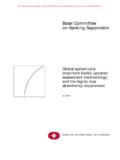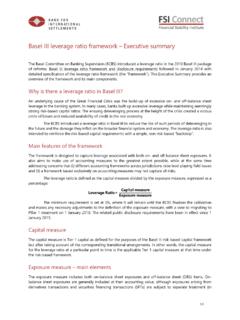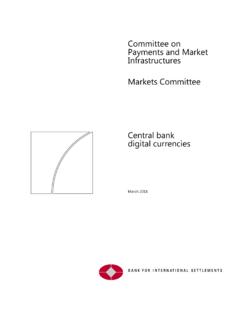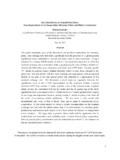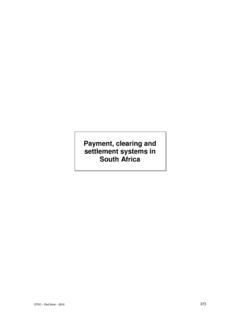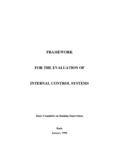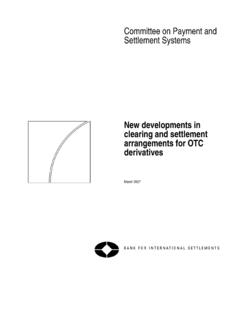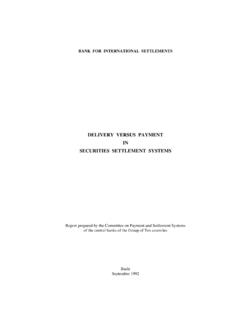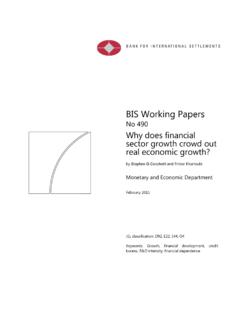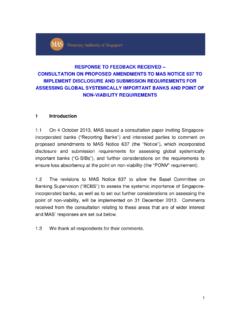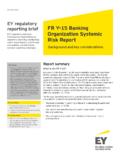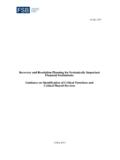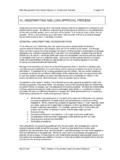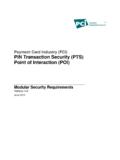Transcription of Basel Committee on Banking Supervision
1 Basel Committee on Banking Supervision Resolution policies and frameworks progress so far July 2011 Copies of publications are available from: Bank for International Settlements Communications CH-4002 Basel , Switzerland E-mail: Fax: +41 61 280 9100 and +41 61 280 8100 Bank for International Settlements 2011. All rights reserved. Brief excerpts may be reproduced or translated provided the source is stated. ISBN print: 92-9131-876-0 ISBN web: 92-9197-876-0 Resolution policies and frameworks progress so far Contents Executive I.
2 II. National resolution regimes and tools ..7 A. Objectives ..9 B. Scope of resolution C. Resolution triggers ..13 D. Resolution powers (other than bail-in) ..14 E. Bail-in ..18 F. Court involvement, safeguards and other requirements ..19 G. Funding of H. Netting agreements and temporary stays to facilitate resolution ..23 I. Segregation of client funds and securities ..26 J. Protection for certain customers of financial institutions ..28 III. Cross-border cooperation and coordination ..31 A. Legal capacity and mandate to cooperate.
3 31 B. Coordination and mutual recognition ..32 C. Information sharing ..33 D. Cooperation IV. Resolvability ..35 A. Recovery and resolution plans (RRPs) ..35 B. Improving V. Suggested policy priorities ..40 VI. Conclusions and next steps ..41 Annex: Questionnaire on the resolution of financial institutions ..42 Resolution policies and frameworks progress so far Report of the Cross-border Bank Resolution Group on key findings of the survey on resolution of financial institutions Executive Summary 1. In March 2010, the Basel Committee on Banking Supervision (the Committee )1 published a report and a set of ten recommendations prepared by its Cross-border Bank Resolution Group (CBRG) (BCBS Recommendations).
4 2 At the June 2010 Toronto Summit, the G20 Leaders endorsed the BCBS Recommendations and expressed their commitment to implement them. Since then, international efforts for developing a comprehensive framework for the prevention and management of crises have gained momentum as effective resolution regimes have come to be recognised as a critical component of any effective approach to addressing the too-big-to-fail problem. 2. The Financial Stability Board Recommendations on systemically important financial institutions (FSB SIFI Recommendations) of October 20103 called for an assessment , on the basis of the BCBS Recommendations and the draft FSB key attributes of Effective Resolution Regimes (FSB key attributes )
5 , of national authorities capacity to resolve SIFIs under existing resolution regimes and of the legislative and other changes to national resolution regimes and policies needed to accomplish effective resolution. 3. Following the G20 endorsement of the FSB SIFI Recommendations, the Committee asked the CBRG to conduct the assessment called for by the FSB. All Committee members participated in the survey and responded to a comprehensive questionnaire by March 2011. This report summarises the results and key findings of the survey and will inform the work on resolution within the FSB and standard setting bodies and feed into the elaboration of the FSB key attributes .
6 Overall progress - trend towards special resolution regimes 4. A number of jurisdictions have adopted legislation, or are considering legislation, to improve their resolution regimes along the lines of the BCBS Recommendations. Recent reforms demonstrate a clear trend towards the introduction of special resolution regimes (SRRs) and tools aimed at public interest objectives, such as the maintenance of financial stability or the protection of retail depositors. The survey shows progress in implementing the 1 The Basel Committee on Banking Supervision consists of senior representatives of bank supervisory authorities and central banks from Argentina, Australia, Belgium, Brazil, Canada, China, France, Germany, Hong Kong SAR, India, Indonesia, Italy, Japan, Korea, Luxembourg, Mexico, the Netherlands, Russia, Saudi Arabia, Singapore, South Africa, Spain, Sweden, Switzerland, Turkey.
7 The United Kingdom and the United States. It usually meets at the Bank for International Settlements (BIS) in Basel , Switzerland, where its permanent Secretariat is located. 2 See Basel Committee , Report and Recommendations of the Cross-border Bank Resolution Group (March 2010) at 3 See FSB, Reducing the moral hazard posed by systemically important financial institutions - FSB Recommendations and Timelines (October 2010) at Resolution policies and frameworks progress so far 1 BCBS Recommendations.
8 That said, it will require renewed focus and energy by national authorities to accelerate reforms of domestic resolution regimes and tools. It will also require a renewed attention to the development of frameworks for their cross-border implementation, which includes the development of institution-specific agreements among relevant national authorities through the work of the Crisis Management Groups. Both developments will facilitate further progress in each. 5. Much work remains to be done to achieve full implementation in all of the surveyed jurisdictions.
9 Reforms are underway at a different pace across jurisdictions. Some jurisdictions have already extended their resolution toolkits in line with the BCBS Recommendations and introduced powers that promote financial stability and facilitate the preservation of essential financial functions (stabilisation and continuity powers). In others, these reforms need to be made. Whereas authorities frequently have similar powers under their respective resolution regimes, the threshold conditions for their use may differ.
10 For instance, in some, certain powers, such as the use of bridge banks, are reserved for systemic situations and therefore must be preceded by a systemic risk assessment . In others, the use of certain tools may be subject to confirmation by a court. Some gaps in national resolution toolkits remain 6. Many countries continue to lack important legal powers to resolve a financial institution in distress. Even if some powers are available, the lack of certain essential powers, including powers to terminate unnecessary contracts, continue needed contracts, sell assets and transfer liabilities, will risk making the resolution of the financial institution s affairs difficult and costly.
